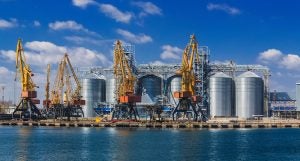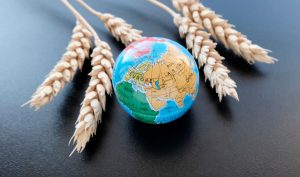Ukraine is often called the breadbasket of Europe, as this area produces a significant number of grains like wheat, rye, barley, and corn, among other staples like potatoes, bees, chicken eggs, and sunflowers. This is partly because Ukraine is the largest country fully contained in Europe and has the greatest amount of arable land on the continent. Russia and Ukraine combined produce roughly 29 percent of the world’s wheat, 20 percent of global corn trades, and 80 percent of sunflower oil production. Compare this to the United States, which produces only about 7 percent of global wheat and is the largest global corn producer but exports about 30 percent of production.
Warfare in Eastern Europe will significantly impact global agriculture. Many countries in the surrounding area depend on Ukraine and Russia for their grain stocks, and with many Ukrainian and Russian ports currently closed, they’ll quickly have to find other sources. Roughly 90 percent of Ukrainian exports travel by sea to their future destinations.

Uncertainty in the region has already pushed certain commodity prices up even higher, continuing the multiyear highs they have been experiencing amid the COVID-19 pandemic. Environmental conditions — including temperature fluctuations and droughts — have led to poor harvests in key countries the past few years, which in turn have led to lower global stocks. Less global supply means there is likely not enough to meet demand in countries that currently depend on Russian and Ukrainian supplies. That then contributes to higher prices.
Areas in the Middle East and Northern Africa will experience price increases and potentially food insecurity if the conflict between Russia and Ukraine persists. Consumers in these regions already spend a large portion of their income on food (Egyptians, for example, spend 50 percent or more of their income on food), so even slightly higher prices can have drastic effects on the individuals living in these areas.
More global demand could mean there is a gap that U.S. farmers could fill, especially as corn planting season approaches. However, the conflict also impacts fuel and fertilizer supplies and prices. Ukraine is the largest European producer of ammonia, a key ingredient in fertilizer. The country also contains the largest European natural gas pipeline, which is also the fourth largest in the world. This is a major issue as fertilizer prices are already up more than 300 percent in some areas of the United States. With transportation difficulties and COVID-related supply losses having driven the price of fuel and fertilizer up, it’s increasing the overall cost of production for farmers.
One European fertilizer company, Yara International, noted recently that with the geopolitical conditions out of balance, the biggest sources of raw material to Europe’s food production are being subject to limitations, and there are no short-term alternatives. A potential consequence of this is that only the most developed and wealthy nations will have access to food.

Increased input costs may make it unfeasible to supply grain demands to countries across the world who may have difficulty paying the expected higher costs. Farmers are still struggling with impacts from the pandemic, making this international conflict another potential hardship for the industry. Although American consumers are starting to see drastic price increases to food, it could be getting worse.
A persistent conflict in Eastern Europe can exacerbate the already prominent supply chain issues affecting agriculture. A halt in Ukraine’s production of metals like iron, steel, and titanium can delay building and equipment projects. Since warfare will include battles by land, sea, and air, there could be impacts on global sea trade in the area and international shipments by air as companies avoid the area. Lastly, economic sanctions already being imposed on Russia could further reduce stocks of key supplies needed to maintain a functioning agriculture industry in the United States.
International relations will always have a ripple effect as our global markets are so interconnected. A persistent conflict in Eastern Europe could have extended and potentially drastic effects on a large variety of industries, which will certainly be felt by Americans and other global consumers.
Michelle Miller, the Farm Babe, is a farmer, public speaker, and writer who has worked for years with row crops, beef cattle, and sheep. She believes education is key in bridging the gap between farmers and consumers.



